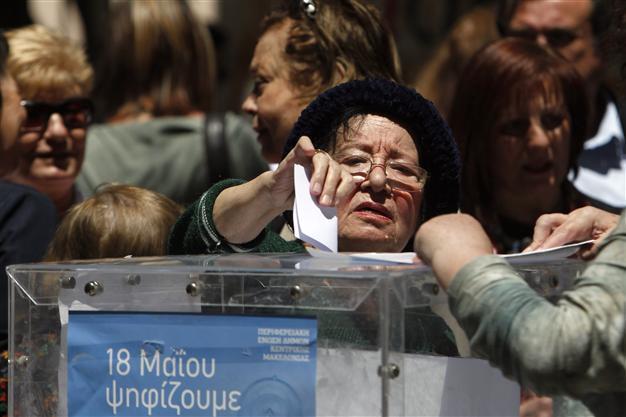Close race in Greek local elections between leftists, government
ATHENS - Agence France-Presse

An elderly women casts his ballot at a polling station, in the northern Greek city of Thessaloniki, Sunday May 18, 2014. AP Photo
A first round of local elections in Greece on Sunday showed no clear victor hours after polls closed, with the anti-austerity leftist Syriza party battling for Athens and the coalition government's candidates holding on outside the capital.Syriza, which opposes the EU-IMF bailout deal, initially grabbed an early lead in both the city of Athens and the greater region, exit polls showed.
But as the results began coming in, the incumbent Athens mayor and governor, who are backed by the socialist Pasok party in the government coalition, narrowed the gap.
Nevertheless, the radical leftist party's 39-year-old leader Alexis Tsipras insisted his movement could still deal a fatal blow in the second round on May 25.
"The best goals are scored in the second leg," Tsipras told reporters outside his party offices.
Syriza want to use these local elections -- and the European polls next week -- as a referendum against austerity and springboard for general elections, which could come as early as February next year.
"Our country will send a strong message to Europe and the world...that it is entitled to decide its policy based on the good of the people," Tsipras said in a televised statement early Monday.
Prime Minister Antonis Samaras, head of the conservative New Democracy party, had warned that a vote for Syriza could derail reforms demanded by the country's EU-IMF creditors.
Late on Sunday, Samaras said early results were "very positive" for his party, but warned that voters had to choose whether to "steadily move forward or let the country slide back".
"This is a battle in which Greece must show that it has the stability that it deserves," the prime minister told reporters.
With nearly 30 percent of polling stations accounted for, government candidates seemed set to hold on to the city of Thessaloniki and the key regions of Thessaly, the Peloponnese and Crete.
But the government could lose the main port of Piraeus, where the conservative mayor is lagging behind a candidate openly backed by the city's favourite sports club, Olympiakos.
Early results showed a turnout of around 60 percent.
A government official insisted the fight was far from over.
"For a political verdict, we must wait for the result of the entire vote, not just Athens," New Democracy parliament speaker Makis Voridis told Mega channel.
"The situation will be better (for the conservatives) in the periphery," added Administrative Reform Minister Kyriakos Mitsotakis.
The conservative vote in Athens was split between two candidates, both of whom were eliminated from the second round.
"Had our forces been united, our party would have been on top by far," the official New Democracy candidate Aris Spiliotopoulos said.
For the first time since 1974, New Democracy has no mayoral candidate in Athens in the second round, and its voters are likely to give incumbent Athens Mayor George Kaminis a boost next week.
Similarly, the race is now on for Syriza, New Democracy and Pasok to win over the voters of smaller left-wing candidates eliminated in the first round.
The local ballot will gauge support for the embattled government coalition after two years of unpopular austerity reforms in return for EU-IMF bailout loans.
Candidates put forward by the neo-Nazi party Golden Dawn look set to score double-digit results in some areas despite an ongoing criminal investigation into the party.
Golden Dawn's candidates for Athens mayor and regional governor are likely to receive between nine and 16 percent of the vote, the exit polls showed.
Ten million voters were registered to elect 325 mayors and 13 regional governors across the country, with second rounds to be held on May 25 where necessary.
New Democracy and Syriza last went head-to-head in June 2012 against a backdrop of fears that Greece was on the verge of being forced out of the eurozone.
Anger over austerity policies propelled Syriza from just five percent of the vote to 27 percent in that election, narrowly losing to New Democracy.
Two years later and the fear of a "Grexit" -- Greece's exit from the eurozone -- has receded, with a general confidence that the country can finally emerge from six years of grinding recession and retrenchment.
Greece is about to register slim growth in 2014, and painful fiscal reforms mandated by EU-IMF creditors finally seem to be paying off.
But this progress has come at a heavy cost -- record unemployment, mounting poverty and a 25-percent decline in the country's overall output.
















